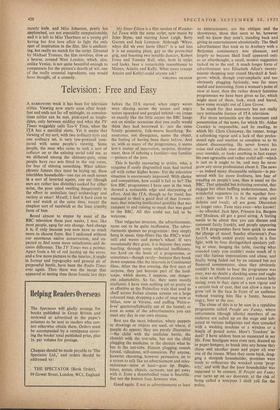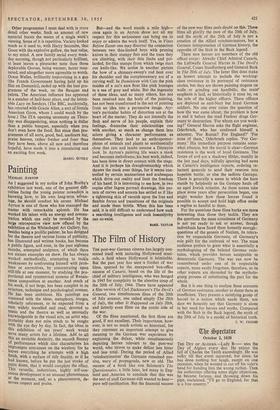Television : Free and Easy
A HARROWING week it has been for television critics. Viewing now starts soon after break- fast and ends not far off midnight, so conscien- tious critics can be met, pink-eyed as troglo- dytes, only between midday and what the TV Times waggishly calls Tea-V Time, when the ITA has a merciful siesta. Yet it seems that viewing of my sort, with two ordinary eyes and one ordinary set, is very low-powered com- pared with some people's viewing. Some people, the man who came to tack a sort of radiator on to the existing aerial told me, as we slithered among the chimney-pots, some people have two sets fitted in the one room, for fear of missing something. What schizo- phrenic futures they must be laying up, these teleridden households—one eye on each screen In a sort of inverted squint, one ear (though ears are rather less divisible) cocked for either noise, the poor mind swelling dangerously in the effort to assimilate (say) archeology and variety at once! Myself, I find it hard even to eat and watch at the same time, except the simplest sort of sandwich or the least crumby form of bun.
Bored 'almost to stupor by most of the BBC television these past weeks, I was, like most people, agog for any change. And change it is, if only because you now have so much more to choose from. But I reckoned without our enormous native conservatism, and ex- pected to find some more cataclysmic and de- cisive difference. The TV Times was a pointer. Apart from a bit of red jazzing up the cover, and a few more pictures in the interior, it might in format and typography and general air of purposeful bustle, have been the Radio Times over again. Then there was the image that appeared at testing time those frantic last days before the ITA started, when angry waves were chasing across the screen and angry noises squeaked and gurgled behind—an image so exactly like the little carpet the BBC hangs out on similar occasions that you really would think they had borrowed it : just the same faintly geometric, folk-weave hearthrug. Re- assurance, not divergence, seems the object, the feeling of having been there before. And so, with so many of the programmes, it seems less-a matter of innovation, surprise, develop- ment, than of echoing a familiar—too familiar —pattern of the past.
This is hardly reassuring to critics, who, a sanguine if easily disgruntled race, had started off with rather higher hopes. Yet the television situation is enormously improved. With choice and competition, how could it fail to be? The few BBC programmes I have seen in the week showed a noticeable edge and sharpening of effort. And the ITA, though so far timid, has managed to shed a good deal of that frowsti- ness, that mincing intellectual gentility that was rampant in and ruining so much that was good in the BBC. All this could not fail to be welcome.
That vulgarian invasion, the advertisements, turns out to be quite inoffensive. The adver- tisements sponsor no programme : they simply hang in space, time-fillers like the BBC's wind- mill and waves and potter's wheel. If very occasionally they grate, it is because they come hustling, through some technical inefficiency, too hard on the heels of a programme, or sometimes—though rarely—because they break down suspense, like the intervals in Continental films. After the first evening, the first start of surprise, they just become part of the land- scape, which shows, I suppose, our danger- ous adaptability. So far, they seem mostly mediocre. I have seen nothing yet as pretty or as effective as the Palmolive train that used to chuff across Italian cinema screens on a large coloured map, dropping a cake of soap now at Milan, now at Verona, and puffing 'Palm-o- li-ve' quattrosyliabically out of the funnel; or even as some of the advertisements you can meet any day in our own cinema.
Best are the most inhuman, where puppets or drawings or objects are used, or where, if people do appear, they arc purely illustrative —the child with the medicine bottle, the chemist with the test-tube, but not the child plugging the medicine, or the chemist what he has in the test-tube. Human plugging sounds forced, ridiculous, self-conscious. Put anyone, however charming, however persuasive, on to a screen to talk like an advertisement and sales- resistance—mine at least—goes up. Jingles, tunes, noises, objects, cartoons, can get away with it. Even a disembodied voice is bearable. But not the human face, however nice.
Good again, if not as advertisements at least as entertainment, are the oblique and the throwaway, those that seem to be, however well we know they aren't, standing back and giving us entertainment altruistically. The Shell advertisement that took us to Avebury with a Betjeman commentary was pleasant, and largely so because Shell itself appeared only as an afterthought, a small, modest suggestion tacked on to the end. A much longer form of advertisement was Elizabeth Allan's twenty- minute shopping tour round Marshall & Snel- grove, which, though over-emphatic and too obviously plugging furiously, was far more useful and interesting, from a woman's point of view at least, than the rather dreary feminine programmes we have been given so far, which might most of them, lock, stock and barrel, have come straight out of Lime Grove.
So much for that necessary but not really very noticeable feature of ITA television: Far more noticeable are the treatment and presentation of the news, for which Mr. Aidan Crawley is responsible, and its reading, to which Mr. Chris Chataway, the runner, brings a refreshing vigour and a lack of that profes- sional ogle and unction so complete as to be almost disconcerting. He never lowers his voice and eyelids over disaster, or looks coy over scandals, or looks anything in fact except his. own agreeable and rather stolid self—which is just as it ought to be, and may he never grow any more professional about it. The news
— as indeed many discussable subjects—is pre- sented with far more liveliness, less fear of treading on people's toes, than is usual on the BBC. That splendid but irritating restraint, that depot but often baffling understatement, that wonderful vagueness (as in the weather fore- cast : •here too ITA is far more crisp and definite and local): all are gone. Discretion no longer rules. Taste may even—who knowS?
— be offended. Jack Spot, Princess Ira, Burgess and Maclean, all got a good airing. A feeling seems to be about that you can discuss and comment fairly frankly, and people appearing on ITA programmes have been quick to sense the change of mood. Sunday afternoon's Free Speech, which ende'd pretty nearly in a free fight, with its four distinguished speakers yell- ing at once, banging the table, roaring what sounded (only you couldn't make much of it out) like furious imprecations and abuse, and finally being faded out by an amused but not flustered commentator, since they obviously couldn't be made to hear the programme was over, was no doubt a shocking scene and ought to raise an affronted protest : yet I cannot help seeing, even in that, signs of a new vigour and a certain lack of cant, that can allow a man to grow red in the face in front of an audience without treating him like a funny, because angry, bear at the zoo.
The abuse of this is to be seen in a repulsive programme called People are Funny, where unfortunate (though idiotic) members of an audience are called up on the stage and sub- jected to various indignities and then consoled with a washing machine or a wireless or a bunch of pound notes. Here's 'freedom' in- deed! I have seldom been so nauseated in my life. Four hooligans were even sent, dressed up as paper-hangers, to break into any house they chose and smother paste and paper all over one of the rooms. When they came back, drag- ging a sheepish householder, promises were made to redecorate the wrecked room 'prop- erly,' and with that the poor householder was supposed to be content. If People are Funny ever turns up on my doorstep, at the risk of being called a sourpuss I shall yell for the police. Other programmes I must deal with in more detail other weeks. Such an amount of new material bursts the seams of a single week's viewing. Some of it is repetitive. Variety looked much as it used to, with Harry Secombe, that Goon with the explosive guffaw, the best value, to my mind. A new family serial every week- day morning, though not particularly brilliant, at least leaves a pleasanOer taste than those deplorable Groves, being warmer, better man- nered, and altogether more agreeable to watch. Orson Welles, brilliantly improvising in a gap (the French Government having held up his film on Domenici), ended up with the best pro- gramme of the week, on the Basques and Pelota. The American influence has appeared in a number of half-hour plays, and the inimit- able Lucy on Sundays. (The BBC, incidentally, has retorted with Gracie Allen, a sort of female American Goon, whom I could watch by the hour.) The ITA opening ceremony on Thurs- day was disappointing, since nothing is duller than a public banquet, especially when you don't even have the food. But since then pro- grammes of all sorts, good, bad, mediocre but, praise heaven, rather fresher and freer than they have been, above all new and therefore hopeful, have made it into a stimulating and an exciting first week.
ISABEL QGIGLY



































 Previous page
Previous page